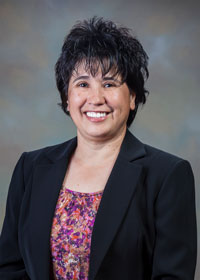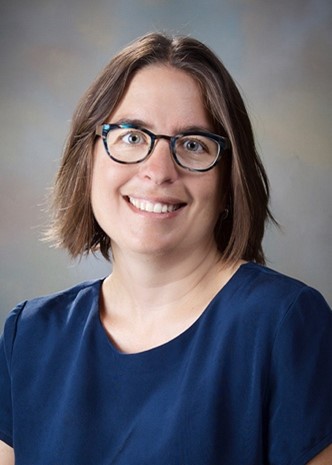
Rita Gonzales
Sandia National Laboratories
Nuclear Deterrence Modernization and Future Systems Associate Labs Director & Chief Systems Engineer
Biography
As the Nuclear Deterrence Modernization and Future Systems Associate Labs Director and Chief Systems Engineer for Sandia National Laboratories, Rita A. Gonzales ensures systemslevel execution of Life Extension Programs and Alterations while serving as the primary Sandia interface with leadership at Los Alamos and Lawrence Livermore national laboratories, Kansas City National Security Campus, and Pantex Plant regarding changes to nuclear weapons modernization programs and potential new systems.
Before taking on leadership of the division, Rita was the director of advanced systems and transformation at Sandia, where she led the development of safe, secure, trusted and mission-capable weapon designs and architectures using rapid development cycles, innovative design methodologies and advanced evaluation techniques supporting a multitude of national security customers.
Prior to that, Rita served in several other leadership roles at Sandia. As director of electronic systems, she led the design and development programs in radio frequency and electronic systems. As deputy director of threat intelligence, Rita was responsible for several strategic initiatives, including external partnership development, nuclear weapon cyber initiatives, and helping build a strong partnership between Sandia program areas.
Rita also served as senior manager of the firing and embedded systems group in weapon design and assurance, where she was responsible for full life-cycle development of several non-nuclear components, including sub-systems and secure system processing.
Beginning as an Application Specific Integrated Circuit (ASIC) designer, Rita spent 17 years in microsystems science, technology and components, rising to project lead, department manager and senior manager. She had full responsibility for the design, development and production of several custom ASIC products developed at the Sandia’s Microsystems and Engineering Sciences Application complex and at external commercial foundries.
Rita earned her master’s degree in electrical engineering from Stanford University and her bachelor’s degree in electrical engineering from New Mexico State University.
Rita is an active community member and currently serves as a member of the New Mexico State University Electrical and Computer Engineering Department Advisory Board.

Christopher S. Ritter
Idaho National Laboratory
Department Manager, Digital Engineering and Director, Digital Innovation Center of Excellence
Biography
Christopher Ritter is the director of the Digital Innovation Center of Excellence and department manager for Digital Engineering at Idaho National Laboratory (INL). At INL, he leads digital twinning, digital engineering, and digital thread technologies across a portfolio of energy, nuclear, non-proliferation, and defense applications. He has led research and development of new INL capabilities to foster digital innovation including energy ontologies, model-based design processes, digital thread software (ex. Deep Lynx), on-demand cloud architectures, and application of explainable artificial intelligence models to enable the laboratory’s net zero energy future.
His research at INL has been featured in the American Society of Mechanical Engineers magazines and journals, Federal News Network, American Nuclear Society Newswire, and as a plenary speaker at digital twin events. Additionally, he is a staunch supporter of inclusive diversity and serves as co-president of Newcomers in Leadership for the Executive Inclusion Council at INL.
Before coming to INL, he was director of software development at SPEC Innovations, in Manassas, Virginia. He served as the chief architect of Innoslate, a popular systems engineering tool used in 107 countries around the world that leverages elastic cloud technologies and AI/NLP for high scalability and advanced analytics. Architected the software system and consulted on the data ontology for a centralized mission risk management system for the Joint Staff at the Pentagon and supported Marine Corps business process reengineering for its Capability Portfolio Management processes.
He was also a computer programming teacher for 4 years at St. Michael’s Academy in Warrenton, Virginia and developed an elementary school computer science curriculum. He holds a bachelor’s degree in computer science from Virginia Polytechnic Institute and State University (Virginia Tech).
His primary research interest is holistic approaches to the development of digital twins across energy and defense applications.

Jennifer Gaudioso
Sandia National Laboratories
Director, Center for Computing Research
Biography
Jennifer Gaudioso is Director of the Center for Computing Research at Sandia National Laboratories where she stewards the Center’s portfolio of research from fundamental science to state—of-the-art applications. The Center’s work includes computer system architecture (both hardware and software); enabling technology for modeling physical and engineering systems; and research in discrete mathematics, data analytics, cognitive modeling, and decision support materials. She is also the Program Executive for NNSA’s Advanced Simulation and Computing Program at Sandia.
Previously, she served as the Director of the Center for Computation and Analysis for National Security where she oversaw the use of systems analysis, cybersecurity, and data science capabilities to tackle complex national security challenges. In this role, Jen also led Sandia’s Homeland Infrastructure Security and Resilience Program which was underpinned by “data to decision” capabilities.
Jen began her Sandia career in 2002 and, in 2011, she moved into management, leading the International Biological and Chemical Threat Reduction Program. Jen’s leadership established Sandia as a critical contributor to the U.S. government’s response to the Ebola outbreak in West Africa. The team’s ground-breaking efforts were also acknowledged with a DOE Secretary of Energy Award. In her role as Senior Manager for Global Strategic Futures, Jen led development of the Global Security Division’s mission, science and technology pipeline, and mission-aligned programs. She also led Sandia’s contributions to the next-generation Nuclear Command, Control, and Communications (NC3) and coordinated a Sandia-wide emerging non-proliferation initiative at the interface of NA-10, NA-20, NA-80, and DOE-IN, earning a Department of Energy (DOE) Secretary of Energy Award for the team.
Jen served on two National Academies Committees addressing biodefense issues and was an MIT Seminar XXI Fellow. She has a PhD and a master’s degree in physical chemistry from Cornell University and a bachelor’s degree in chemistry from Bard College. Jen’s time at Bard taught her to value diverse perspectives in problem-solving.